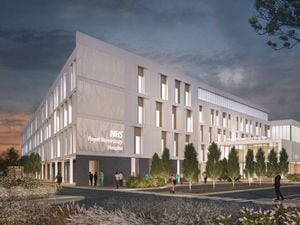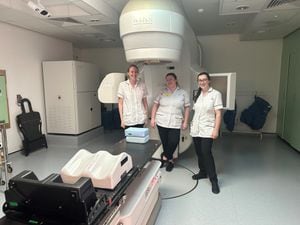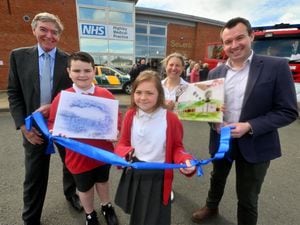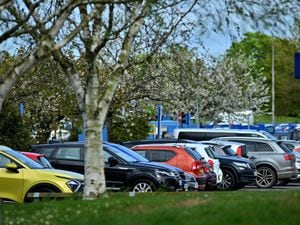Junior doctors in Shropshire on first day of three day of action
Junior doctors at hospitals in Shropshire have started three days of strike action in support of pay demands.
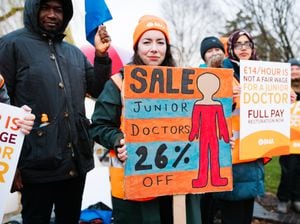
Doctors formed a picket line outside Royal Shrewsbury Hospital on Monday as their union the British Medical Association became the latest in a long line of workers to make their demands.
The BMA is calling for what they call "full pay restoration to reverse the steep decline in pay faced by junior doctors since 2008/09." The hospital doctors at Shrewsbury say this means that their pay is 25 per cent less than what it should be. A junior doctor is on a starting salary of about £29,000 which rises with experience.
Dr Nyree Jackson, a junior doctor in anaesthetics, said she and her colleagues have to pay to take their own exams, as well as having to pay off huge student loans from years of study at university.
"It means I am earning less than I did in my part time job while I was at university," she said. "We work 48 hours a week, including nights and weekends and then have to study."
Doctors on the picket line are concerned about their colleagues leaving the UK to work abroad and the number of holes in their rotas that are having to be filled by more expensive locums.
"Many of my friends are leaving for Australia because we cannot pay for childcare and heating," added Dr Jackson. "At weekends our rate of pay are less than the cleaners."
Medical registrar Dr Rehab Haider , another junior doctor, is often on duty as registrar for the entire hospital and is responsible for life and death decisions.
"Doctors are leaving the hospital," she said. "We call it a brain drain, the kind of thing that used to happen in developing countries which is now happening here. I could work at Pret and earn more in an hourly rate making coffee."
Dr Jackson added: "We are worried that it is going in the wrong direction. If they increased the basic pay people would stay. It is important to have regular staff. Locums are not going to know about the patients where regular staff do."
Dr Andrew Donnelly works as an anaesthetist in intensive care and joined the NHS on 2017-18. He said: "What we want is pay restoration. They wasted billions on track and trace in the pandemic and have just decided to pay millions more to France but it is cuts and cuts and cuts in the NHS.
"The government is penny dumb and pound foolish," he added.
Speaking outside the Queen Elizabeth Hospital in Birmingham, junior doctor Shivam Sharma told PA: "Junior doctors have faced a massive 26 per cent real-terms pay cut over the last 15 years. We are not worth 26 per cent less, we don't do 26 per cent less work, we don't see 26 per cent less patients. In fact, the work has only gotten harder.
"Currently, 50 per cent of junior doctors are struggling to pay rent, mortgage and bills, and 50 per cent are having to borrow money from friends and family just to make ends meet.
"If you or I were going into hospital critically unwell, we couldn't want our junior doctor to be worrying about how they're going to pay their bills.
"So something has to be done - we have to value doctors here if we are going to keep them."
Doctors started their action at 7am on Monday and running through to 7am on Thursday.
The Chief Medical Officer at NHS Shropshire, Telford and Wrekin has urged people to attend their appointment if they have one booked during the coming days of industrial action and to ‘think which service’ before action when deciding on which service is right for their healthcare needs.
The British Medical Association (BMA), the Hospital Consultants and Specialists Association (HCSA) and the British Dental Association (BDA) unions have all announced strike action, along with junior doctors, dental core trainees and specialty registrars.
Dr Nick White, the Chief Medical Officer for NHS Shropshire, Telford and Wrekin, said that NHS health care services will remain open including hospital emergency departments, GP practices, mental health services and community services, although highlights that some delay and disruption is inevitable.
Dr White said: “Patient safety is our top priority. We would like to reassure local people that we are working together across the NHS to try and minimise the disruption to the public.
“Unless people are contacted by their health service provider they should carry on as planned and attend their appointment. Staff will do their very best to honour appointments.
“However, we have to be realistic, and some appointments will be postponed or re-scheduled. During this time the priority will be to ensure those most in need of care are able to receive it.
“A&E departments will be open, and I cannot stress enough how important it is for people with life-threatening conditions to come forward as usual. However, there are a range of other services available – such as NHS 111 online, minor injury units, and community pharmacies."
On Friday, health secretary Steve Barclay invited the BMA to talks but the union rejected the idea, saying there were "unacceptable" preconditions.
The preconditions are understood to have included looking at a non-consolidated lump sum payment for last year.
Junior doctors make up around 45 per cent of the NHS's medical workforce and consultants and other medics have been drafted in to provide strike cover in areas such as A&E.
Mr Barclay said the strike action is "incredibly disappointing".
"It is incredibly disappointing the British Medical Association (BMA) has declined my offer to enter formal pay negotiations on the condition strikes are paused," he said.
"I hugely value the hard work of junior doctors and urge unions to come to the negotiating table and cancel strikes which risk patient safety and impact efforts to tackle the backlog. I want to find a fair settlement which recognises the crucial role of junior doctors and the wider economic pressures facing the UK.
"I've been having constructive and meaningful talks with unions representing nurses, ambulance workers and other non-medical staff, which have agreed to pause strike action, and negotiations will continue this week.
"We have been working closely with NHS England on contingency plans to help protect patient safety during strikes, prioritising emergency, urgent and critical care - but there will inevitably be some disruption for patients."

